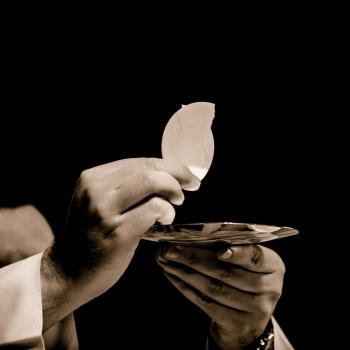Almighty God, you have given your only Son to be for us a sacrifice for sin, and also an example of godly life: Give us grace to receive thankfully the fruits of his redeeming work, and to follow daily in the blessed steps of his most holy life; through Jesus Christ your Son our Lord, who lives and reigns with you and the Holy Spirit, one God, now and forever. Amen.
Collect, Book of Common Prayer
Contrary to popular opinion, Episcopalians do not refer to the prayers we say at the beginning service as “collects” because we love obscure words for almost everything. The word, “collect,” actually comes from the Latin word, collecta, meaning “a gathering.” And it was used as early as the 5th century by the church to describe the opening prayers used in worship.
The idea behind the word is that these opening prayers “bring together” our individual prayers worship and give them a single voice. Collects are also designed to “bring together” the thoughts of the day’s readings from Scripture into the form of a prayer. So, the themes of most collects are usually reflected in the longing or challenges raised by the Scriptures that we read.
This has important implications for the way in which we understand and use these prayers:
One, they are focused and purposeful. If they don’t seem that way, if they feel more like a verbal “surf” washing over us, it is largely because we fail to focus on the words that we say and drop into autopilot.
Two, they are deeply imbedded in the Bible. It is not unusual for our Christian brothers and sisters to complain that our worship isn’t biblical. But, in fact, apart from being every bit as old as the Bible itself, the form our worship takes is shot through with the language of the Bible. And the collects are an attempt to distill what the Bible has to tell us on any given Sunday into the form of a prayer for God’s help to live into the meaning of Scripture.
Three, collects are based on the promises of Scripture concerning prayer. Scripture says that whenever two or three are gathered, God is with us. The Bible also enjoins us to agree as we pray. What could be more important, for us to agree upon and pray for than that God realize the purpose of his word in our lives?
Finally: If you’ve been following me, you will realize that we also believe that the prayers we say in worship are not just supposed to express ideas. Our prayers are also meant to change us, to form us, to mold us into the kind of people God longs for us to be.
So, with that as a bit of background, what are we are praying for in today’s collect? And what does the Scripture that we’ve read have to suggest about that prayer?
Let’s take it line by line:
Almighty God, you have given your only Son to be for us a sacrifice for sin…
When we pray this prayer the first thing that we are doing is that we are acknowledging that in Christ God has spared us the consequences of our sin. It’s common for people who don’t understand Christianity to argue that God is out to get us. But, actually, nothing could be further from the truth. It would be more accurate to say that God is out to save us from ourselves.
Now, given the way that we sometimes talk about sin in the church, there are many people who think that the only person who really needs to be saved is the spectacular sinner: the compulsive liar, the abusive husband, the murderer, the rapist, the embezzler. But anyone who has looked at their own sins in anything like an honest fashion has understood why there is so much truth in the saying, “There but for the grace of God go I.”
Apart from that, however, the other way in which we all need saving goes to the questions of identity, meaning and purpose. Without God, it is impossible to arrive at adequate answers to life’s most pressing questions: Why am I here? What is the point of life? What is a good life? How should I make decisions? What does it mean to be moral? What will happen to me when I die? Will I endure at all? Will my life have been of any lasting significance?
Our society is in a mad scramble to answer those questions, relying on race, gender, sexual orientation, intersectionality, and politics. But every one of those approaches are based upon contingent notions of what it means to be a human being. In any other day and age, those considerations would have been and will be different. There is nothing lasting or essential about any of them – and as the pace of changes demonstrates, none of them have the shelf life of ice cream.
So, when we acknowledge in our prayers that God has saved us from our sins, we are not just talking about being saved from the consequences of immoral actions. We are talking about being saved from “missing the mark” in other ways. Defining ourselves in terms that are of passing importance. Defining ourselves in terms that aren’t essential to what it means to be a human being. Defining ourselves in terms that are self-absorbed and narcissistic.
God in Christ is the first responder who steps into the maelstrom of a society that we’ve created and finds a way out through the death and chaos that we leave in our wake.
But then the prayer goes on to acknowledge that in Christ God has also given us an example of how to live.
For those of us who have been taught that the Christian faith is all about getting our name moved from the column “damned and going to hell” to “saved and going to heaven,” this is good news. What a message of despair it would be if Jesus simply set out an impossible standard or just “saved us” with the caution that we should hold on for dear life until we die.
The question remains, of course, how does that example change us? Christians have had a variety of answers to those questions over the centuries.
Some have pointed out that it involves imitation. And, obviously, for imitation to work at all involves time spent meditating on the example of Jesus. In part, that is why we read the Gospel every Sunday and why we emphasize the place of the Gospel in our worship with a procession.
But that isn’t enough, of course. While there are deep similarities in every generation, the situations that we encounter, the challenges that we face are also very different from those of Jesus’ day. And, more importantly, we all know that – try as we may – we fall short of the example that Jesus sets.
This is why today’s collect is paired with the reading we just heard from the Gospel of John: “I am the living bread that came down from heaven. Whoever eats of this bread will live forever; and the bread that I will give for the life of the world is my flesh.”
We don’t simply meditate on the example of Jesus and imitate him, we rely on his grace and his presence – and, in the Eucharist, we take the life of Christ into us. Which is why the collect goes onto say:
Give us grace to receive thankfully the fruits of his redeeming work, and to follow daily in the blessed steps of his most holy life…
To “receive thankfully the fruits of his redeeming work” is to take seriously the words of Jesus in John’s Gospel: “Those who eat my flesh and drink my blood abide in me, and I in them.” (If you were wondering if Episcopalians believe in miracles, you have your answer.)
Not long ago we were talking with a friend who has been an Episcopalian for a long time, but she and her husband moved recently, and they decided that they would explore other possibilities for a church home. So, they visited a nearby megachurch. Afterward, they told us about their experience. “You know it was great.” There was a lot of energy. There was great music. The people who attend the service are obviously devoted. But it struck us that the approach to worship in those settings is basically the combination of a rock concert and a TED Talk.
Meaning no offense to our brothers and sisters in Christ, that is exactly the difference. Our worship is organized around the words of Jesus: “Those who eat my flesh and drink my blood abide in me, and I in them.”
We know it isn’t enough to try hard to imitate Jesus. We know it isn’t enough to work on getting our ideas about Jesus straight. Ultimately, we depend upon God’s grace and that grace is given to us, Sunday after Sunday, in the Eucharist, a word that we use because it means, “to give thanks.”
If there wasn’t any other reason for coming to church – that would be enough.
So, to put the collect in more contemporary terms, we pray:
God, your only Son – the perfect first-responder – broke into the place where we were held captive by our own choices and saved us from the consequences of our sin, giving our lives meaning and purpose. Your Son also showed us how to live. But more than that he promised to give himself to us in his body and blood. Give us the grace to receive this gift with grateful hearts and the strength follow him; through Jesus Christ your Son our Lord, who lives and reigns with you and the Holy Spirit, one God, now and forever. Amen











